After getting embarrassed in Thurn and Taxis, getting crushed twice in Terraforming Mars, a close third place in Ra and a respectable second place in Castles of Burgundy, I saw my chance at glory at hand. I felt as if I was about to avenge all of those loses with my first tournament victory by taking the second heat of Castles of Burgundy. I had completely filled my board, sans the animal pastures (I often choose to ignore the animal pastures in Burgundy if possible). I also had snagged five of my favourite building tile (City Hall) and its related knowledge tile giving me 20 endgame points.
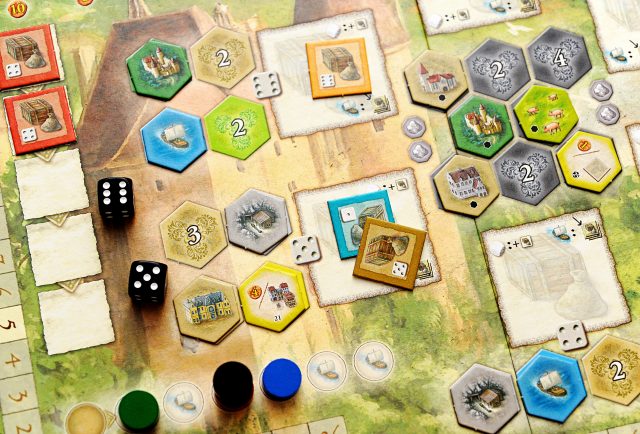
I knew that my third-place standing was temporary heading into the calculation of end-game points. And it did, I surged to first place, feeling confident in my victory until Nick showed off his stack of knowledge tiles, jumping from a distant fourth place to the win. My triumph was short-lived.
This all happened at EuroQuest, which I recently attended in Pikesville, Maryland, where I got my first real taste of tournament board gaming. Last year at PaxUnplugged I did partake in some tournaments of more casual games (Resistance, Love Letter and Wits and Wagers, which my team won), but this was something much different.
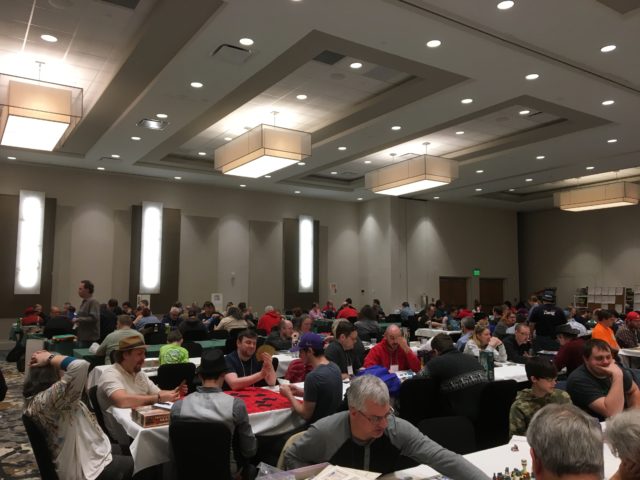
If I am being honest, it wasn’t the 18 Eurogame tournaments that drew me to EuroQuest, so much as it was a chance to play boardgames with friends and strangers for five days straight (also they were bringing some games that were recently released at Essen for people to try out) that led me to trek to a hotel in suburban Baltimore. Once I was there, I figured I would give it a shot and see how I stacked up, and beside my first tournament game, the aforementioned Thurn and Taxis (a game I love but haven’t played in two years and quickly realized I had forgotten some of the rules and all of the strategy of), I did not embarrass myself too badly. And when I realized that many of the people I lost to in the heats went on to make the finals or claim the title, I felt a bit better about my mediocre boardgame talents.
EuroQuest, which has been going on since 2003, attracting more than 300 people a year, has plenty to offer more casual gamers. My friend Andrew, who had attended last year and told me about the convention, cited the Wild Card Tournament as one of the more interesting and unique aspects of EuroQuest. Essentially there are 16 games divided into 4 categories based on game-play length. At any point during the convention you can play those games, record the scores and earn points. The only restrictions being that you can get maxed out on each game, so you can’t just keep dominating Can’t Stop, while not playing any of the other 15 games and win the event.
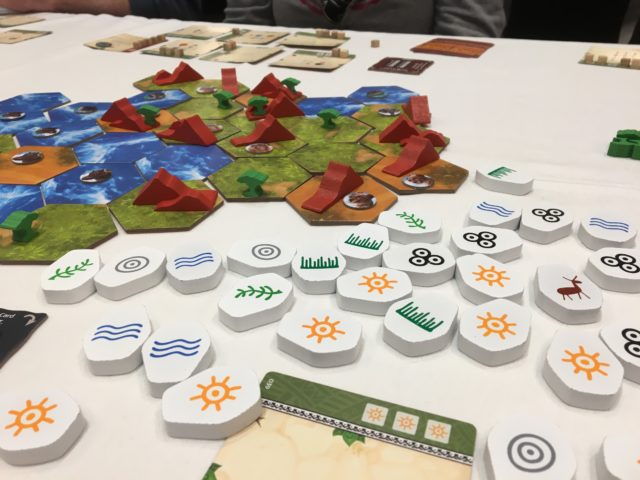
There was also plenty of open gaming available, thanks in part to a well-stocked library provided by the Game Clubs of Maryland, who run EuroQuest with a group of volunteers. Many people also brought their own games.
EuroQuest also had more than 20 play-to-win games, which means that if you play one of the qualified games you submit the play and are entered into a draw to win that game. (Side note I won one of the play-to-wins: Funkoverse: Harry Potter.) And EuroQuest’s generosity did not end there, they had also acquired nine recent Essen releases that were available to be played and then given away by a random draw. Not surprisingly the Essen games were very popular at EuroQuest. I don’t think Maracaibo from Alexander Pfister (Mombasa, Blackout: Hong Kong) was never not being played.
I got to try out a couple of them myself. It’s a Wonderful World by Frédéric Guérard is a light-medium card drafting, engine-building game that I would compare to Century: Spice Road. There are five different resources being produced each round, but they are produced in a certain order. You are trying to use those resource to complete cards that can get you points and/or build your engine. You can build up some good combos where you produce resource A, that finishes a card, and that produces resource B, which helps finish a card that produces recourse C … and so on. I enjoyed it and would definitely play it again if given the chance.
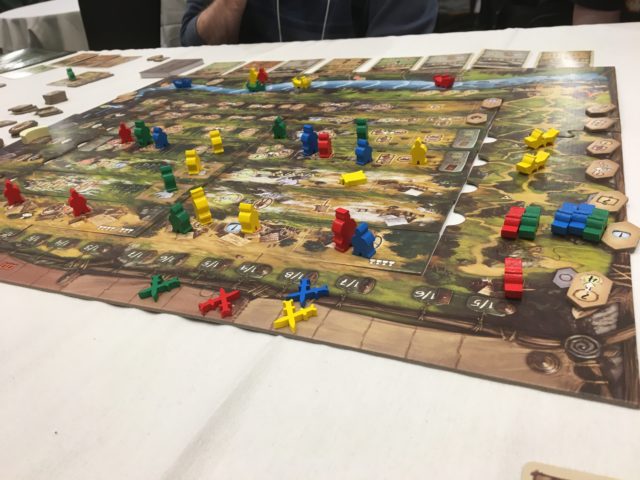
The other Essen-release game I got to play was Terramara by the same design team that worked on Egizia. Terramara a medium-heavy worker-placement game with several very interesting mechanisms. The board is set up in 5 eras, after each era is complete the current era’s game board is flipped over, removing several action spaces and replacing them with fewer, different spaces. You can play workers to later eras but you do not get them back until the end of that era. In general, the later eras have more powerful action spaces, so you could take the instant benefit of a later era spot but then you will be down a worker for a round or two, or the rest of the game if you select the last era. I enjoyed Terramara and want to give it another go.
While tournament play is a big part of EuroQuest, there is plenty of open gaming going on, so if you are intimidated by tournament gaming, as I was heading in, you won’t be left out, and as I quickly learned, thanks to a suggestion from my friend Sara, it is helpful to just look at tournaments as scheduled games. That way when you lose over and over again, no biggie (no I swear I am not talking about myself).
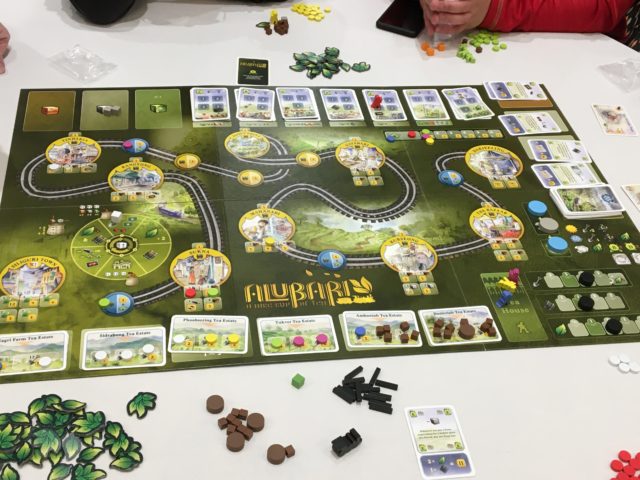
EuroQuest also had many other aspects that similar boardgame conventions have, such as a Math Trade, a Bring and Buy/Auction Store (I found some good values here even with the exchange rate), game demos, RPGs, a local retailer (Canton Games that had several games available to demo) and day-long Mega Civilization game.
Over the five days at EuroQuest I got to learn 11 new games (including Ecos, Obsession and Parks just to name a few) and play several old favourites, many of them in the Wild Card tourney, which I ended up in the top 10 of (mostly through quantity of plays not quality).
As things were winding down on Sunday I was invited by a pair guys to play Terraforming Mars. We were joined a fourth player who cracked open her fancy 3-D printed tiles to make my third TM game of the week a much more visually exciting game. My last game of EuroQuest exemplified the best thing about gaming conventions: playing game you love with strangers, two of whom drove 7 hours from North Carolina, one local and one crazy Canuck who took and a more than 8-hour road trip to be there. After the game (which hey I won!!) we all stood around taking pictures of our newly terraformed Mars in all its 3-D printed glory.
Comments
No comments yet! Be the first!